

Fertility. Nursing habits. Blood donation. Avoiding Saggy Breasts Syndrome After Breastfeeding. One of the saddest things I sometimes hear from women who are pregnant or plan to become pregnant is that they intend to bottlefeed their baby because they’ve been warned, usually from their Mothers, that breastfeeding causes droopy, saggy breasts.
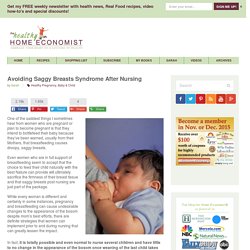
Even women who are in full support of breastfeeding seem to accept that the choice to feed their child naturally with the best Nature can provide will ultimately sacrifice the firmness of their breast tissue and that saggy breasts post nursing are just part of the package. While every woman is different and certainly in some instances, pregnancy and breastfeeding can cause undesirable changes to the appearance of the bosom despite mom’s best efforts, there are definite strategies that women can implement prior to and during nursing that can greatly lessen the impact. In fact, it is totally possible and even normal to nurse several children and have little to no change in the appearance of the bosom once weaning of the last child takes place. Will Using a Pacifier Affect My Breastfed Baby? Sara Walters Carmarthen Wales UK From NEW BEGINNINGS, Vol. 24 No. 6, November-December 2007, p. 279 Pacifiers, also known as "dummies," can seem like an essential tool in the parents' calming arsenal.
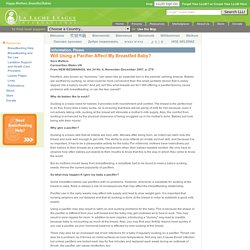
Babies are soothed by sucking, so what could be more convenient than this small portable device that is easily slipped into a baby's mouth? And yet, isn't this what breasts are for? Will offering a pacifier/dummy cause problems with breastfeeding, or can the two coexist? Why do babies like to suck? Sucking is a basic need for babies; it provides both nourishment and comfort. Why give a pacifier? Sucking is a basic skill that all infants are born with. But as mothers moved away from breastfeeding, a substitute had to be found to meet a baby's sucking needs. So what may happen if I give my baby a pacifier? Some breastfed babies use pacifiers with no problems.
Pacifier use in the early weeks may affect milk supply and lead to slow weight gain. Conclusion. First Steps Nutrition Trust - Infants & new mums - Eating well for breastfeeding mothers. Your Natural Birth: Southampton, UK. Breastfeeding versus Formula Feeding is a hot debate.
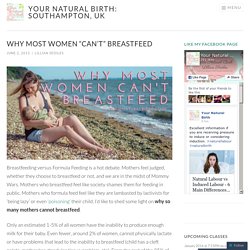
Mothers feel judged, whether they choose to breastfeed or not, and we are in the midst of Mommy Wars. Mothers who breastfeed feel like society shames them for feeding in public. Mothers who formula feed feel like they are lambasted by lactivists for ‘being lazy’ or even ‘poisoning‘ their child. Bust a Myth: Breastfeeding Advocates Need to Stop Using this Statistic! Almost every class, website, online discussion, book, brochure and conversation related to breastfeeding references a statistic: “only 1-5% of women are unable to breastfeed.”
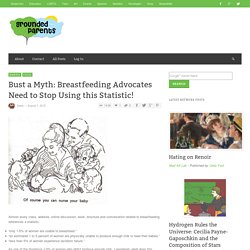
“an estimated 1 to 5 percent of women are physically unable to produce enough milk to feed their babies.” “less than 5% of women experience lactation failure.” As one of the illustrious 1-5% of women who didn’t produce enough milk, I wondered, what does this statistic mean and where does it come from? It almost always comes up in one of the following contexts: Who's Who in Breastfeeding Support and Lactation in the UK - LCGB. The first point of contact for breastfeeding help is often a midwife, health visitor or GP.
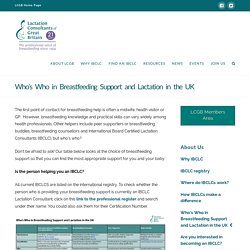
However, breastfeeding knowledge and practical skills can vary widely among health professionals. Other helpers include peer supporters or breastfeeding buddies, breastfeeding counsellors and International Board Certified Lactation Consultants (IBCLC), but who’s who? Don’t be afraid to ask! Our table below looks at the choice of breastfeeding support so that you can find the most appropriate support for you and your baby. Is the person helping you an IBCLC? No nursing while the car is moving! No nursing while the car is moving!
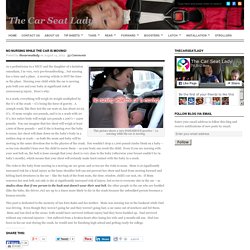
Posted by thecarseatlady on August 14, 2012 · 33 Comments This picture shows a very DANGEROUS practice – i.e. nursing while the car is moving. As a pediatrician in a NICU and the daughter of a lactation consultant, I’m very, very pro-breastfeeding… but nursing has a time and a place. A moving vehicle is NOT the time or the place. Nursing your child while the car is moving puts both you and your baby at significant risk of unnecessary injury. In a crash, everything will weigh its weight multiplied by the G’s of the crash – G’s being the force of gravity.
The More I Learn About Breast Milk, the More Amazed I Am. Not nearly enough people know about this mind-blowing characteristic of breast milk: It changes daily based on signals from the baby. lily padula To produce breast milk, mothers melt their own body fat.
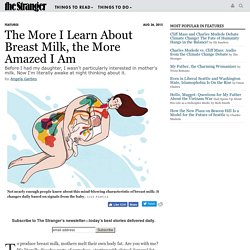
Are you with me? We literally dissolve parts of ourselves, starting with gluteal-femoral fat, aka our butts, and turn it into liquid to feed our babies. Before and after giving birth to my daughter 10 months ago, I was inundated with urgent directives from well-meaning, very insistent health practitioners, parenting book authors, mommy bloggers, journalists, and opinionated strangers that "breast is best. " The message was clear: In order to be a good mom, I had to breast-feed.